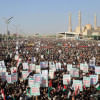A childhood in the Middle East and navigating a life back home
In recent decades, the rapid economic expansion in the Middle East, driven by oil revenues and initiatives to diversify economies, has generated job opportunities and attracted migrants seeking a better life. Today, approximately 43 million people in the Middle East-North Africa region were born in another country or territory. Among them, around 3.6 million immigrants are from Bangladesh, residing primarily in Saudi Arabia and the United Arab Emirates, with smaller populations in Kuwait, Qatar, Oman, and Jordan.
The children of these expats mostly study in embassy-run schools, which either follow the British Curriculum or the National Curriculum of Bangladesh. Tahasina Tasnim Afra, a graduate of Bangladesh International School-Muscat, said, "I sat for my O level and A level exams under the Pearson Edexcel board. My classes were mostly conducted in English. It might come off as a surprise, but I do not speak a word of Arabic, even after living in Oman my entire life. From my experience, many expats I've met in the Arab world also know only a few words but not enough to speak fluently. I feel that this language barrier is one of the primary factors contributing to the Arab–non-Arab segregation."
Adding to this conversation, Md Ahad, an alumnus of Bangladesh International School-Riyadh, and currently a manager at Factory Makabes Al Sharq for Metal Products, said, "I studied under the Bangla medium curriculum until HSC. We even sat for the exams at the exact time students in Bangladesh did."
Ahad also noted, "Our teachers were Bangladeshi migrants like us."
However, Shazzadur Rahman, a software engineer and a former student of Bangladesh International School-Riyadh, pointed out, "The teacher-student ratio was off. There would be only one or two teachers for each subject."
He further explained, "The only teachers available to teach the curriculum were the school teachers. As a result, we had to go for private tuition under these very same teachers. Unlike students in Bangladesh, who had the flexibility to learn from different teachers if they struggled to understand their current ones, we were stuck with the same set of teachers."

"Moreover, since we were studying under the national curriculum, our competition was not supposed to be just with our peers inside the classroom in Riyad," said Ahad.
"Our competition was actually on a much larger scale, but we never got to realise that. Students in Bangladesh compete with their neighbours, cousins, and so on. Healthy competition is beneficial. It pushes one to improve further and stay in the habit of studying regularly. An absence of that leads to a lack of motivation," said Shazzad.
"Unlike Saudi Arabia and Oman, Kuwait doesn't have an embassy-run Bangladeshi school," informed Hashmita, a Bangali-Filipino born and raised in the State of Kuwait. "I studied in an Indian school and completed my education under the CBSE board," said Hashmita. "As a result, I did not really know much about the culture and heritage of Bangladesh. As a matter of fact, I came to learn about the liberation war of Bangladesh and the atrocities committed by the Pakistani army after taking a Bangladesh Studies course in my first semester of university," added Hashmita.
Bangladeshi students in the Middle East typically study there until the 12th grade before moving to Bangladesh for their undergraduate studies, while their families often remain behind.
Afra further said, "There are a few decent universities in Oman. The ones that are worth considering charge very high tuition fees to the international students compared to the locals. I had no other choice but to shift back to Bangladesh and made up my mind to sit for the medical admission test."
Shazzad said, "It is the same case in Saudi Arabia where I feel that the quality of undergraduate education isn't as great. Compared to that, Bangladeshi universities are doing far better. The only difference with Oman is that the tuition fee for a bachelor's degree is equally expensive for both locals and expats in Saudi Arabia. I can study at top-tier private universities in Bangladesh at half that price."
Shazzad also said, "Saudi Arabia is a great option for master's and PhD programmes though, and universities attract students from all over the world, including the United States."
The admission season in Bangladesh lasts for about three to four months at most. It is crucial to utilise this period efficiently to secure a seat at one's target university. However, for many students returning from the Middle East, adjusting to a new environment during this critical phase poses significant challenges.
Shazzad highlighted this difficulty, saying, "It's impossible to focus entirely on studying when a large part of this period is spent just trying to adjust to the surroundings."
For some, the living situation made the transition even harder. Afra shared, "I had to stay at a relative's place during the admission phase, but they made me feel very unwelcome. I missed my parents dearly, and the food didn't suit me at all. I vomited more times than I could count."
Echoing Afra's struggles, Hashmita added, "I also fell sick regularly and even fainted once. When I saw a doctor, he told me I wasn't getting enough nutrients from my diet. Ironically, I was eating more food here than I did in Kuwait, but the average diet here simply isn't as nutrient-rich."
Aside from health and emotional struggles, transportation was another major adjustment for returning students.
"In Saudi, we had our own car for commuting," said Shazzad. "Suddenly having to rely on public transport was a huge inconvenience in the beginning. On top of that, Dhaka is notorious for its traffic. I was not prepared for how many hours I would have to waste just sitting in traffic."
Hashmita also shared her shock at the chaotic traffic situation. "People here are less eager to follow traffic rules," she said. "Once, a bus got so close to the CNG I was in that I thought I was going to die. The driver just laughed and told me, 'This is how people drive in Bangladesh.' In Kuwait, cars stop to let pedestrians cross. Here, if I stop, the car will run over me," she sighed.
These struggles inevitably affected students' performances in their entrance exams.
Shazzad added, "On top of these challenges, we were already behind compared to the local admission candidates, who had been preparing diligently for at least two to three years. That certainly didn't help. I remember feeling completely lost in the early days of my preparation."
For some expatriate students, the challenges began even earlier due to a lack of access to information about the admission process.
Ahad shared, "I wasn't even aware that the admission season had started in Bangladesh. One of the biggest drawbacks of being an expatriate is that we tend to miss out on crucial information like this."
He explained that he only found out about the exams by chance. "I had travelled to Bangladesh to resolve a passport issue. After landing, I learned that the Faculty of Business Studies at Dhaka University was about to conduct its admission exam. The only reason I am a Dhaka University graduate today is because the stars aligned in my favour," he elaborated.
Students who studied under a foreign curriculum faced additional hurdles when applying to their desired universities in Bangladesh. One of the biggest challenges was obtaining an equivalence certificate. An equivalence certificate shows the converted 10th and 12th qualifications to the National Curriculum standard.
Hashmita shared her experience, "While students from the British curriculum also need to go through this process, it is much easier for them because many students follow that curriculum. As a result, university authorities are familiar with the conversion process. Since very few students from the Indian curriculum come to Bangladesh for higher education, the university authorities were unfamiliar with how to handle my case. This led to a lengthy and complicated procedure for me. I had to appear before a jury of six to seven members, who carefully reviewed my transcripts, passport, and other official documents. They also asked me numerous questions. The entire process lasted an entire day and was extremely exhausting."
Many students returning from the Middle East also struggle to adapt to the university environment in Bangladesh. Hashmita said, "Since I am part Filipino and part Bangali, my parents chose English as the primary language at home. My classes in Kuwait were also conducted in English, so my Bangla is not as strong as I would have liked."
She added, "I struggle to keep up with my classes since they are usually conducted in a mix of Bangla and English."
Another challenge these students face is difficulty in relating to their peers. Afra said, "Our life experiences shape who we become. They influence our likes, dislikes, and sense of humour. Because of this, I find it hard to connect with people here."
Hashmita added, "My closest friend in university is an expatriate from Saudi Arabia. I feel he is the only one who truly understands the struggles I am going through, especially that constant feeling of being out of place."
For other students, universities provide their first experience of a diverse environment. Ahad said, "Our classes in Riyadh were segregated by gender, and our classmates came from similar socio-economic and religious backgrounds."
He added, "Bangladesh, by comparison, is a very diverse country where people of different religions coexist. There are people from many indigenous communities here as well. As a result, classroom discussions offered new perspectives and were a breath of fresh air."
Although these students' families used to stay behind when they moved to Bangladesh for university, this is rarely the case anymore. "Oman had temporarily suspended dependency visas for Bangladeshis and later increased the visa costs, making it difficult for many families to continue living in Oman," mentioned Afra.
A similar trend can be seen in Kuwait and Saudi Arabia as the entire Middle East undergoes reformation. Hashmita said, "Kuwait is undergoing Kuwaitisation – a policy ensuring that Kuwaiti nationals get more job opportunities and reducing reliance on foreign workers. They started laying off expats, refusing to stamp working visas for those over the age of 65."
"As my father was over 65, our visas soon expired, and my family had to relocate," added Hashmita.
Hashmita also mentioned, "My mother is a working woman, and she was below 65. Yet, they refused to renew the visa as the husband is considered to be the sole breadwinner even if both spouses are in the workforce. The dependency visas are registered under his name."
Shazzad said, "A lot of rules have been changed recently in Saudi Arabia, which exponentially increased living costs and compelled many families to move back to Bangladesh. Additionally, many government institutions started getting acquired by private companies. They started implementing new rules and regulations. Thus, our family had to shift back to Bangladesh as the family visa got cancelled."
Many of these students have expressed a desire to move back to the Middle East if given the opportunity. Shazzad said, "Living in Saudi Arabia would allow me to perform Umrah more frequently."
Others want to return because of the safety and security offered by Middle Eastern countries. Afra said, "I had my own driving license in Oman and used to travel freely with my friends. Given the rise in violence against women and the cases I hear about in the news, I can't imagine travelling alone here."
However, securing a job in the Middle East as a foreigner is not easy, especially when there is no longer a family member back there. Ahad explained, "Saudi Arabia operates on a referral system. Job hirings aren't as open to foreigners – it's a much more gated process. Openings aren't publicly announced, and foreigners cannot just apply anywhere. Having a referral from a Saudi national significantly helps."
He added, "Moreover, getting professional degrees like Chartered Accountant (CA) and Certified Management Accountant (CMA) accredited costs around BDT 2 to 4 lakhs. Professionals such as engineers must also pass a licensing exam before they can officially use their titles."
However. for many of these students, these countries were home, even if temporarily. Nevertheless, the transition is one that is often complex and may have far-reaching impacts on the concept of home itself, and the ideas of their own identities.
Afra shared, "Sure, the Middle East has its flaws, just like anywhere else. But it has been my home for most of my life. I know I'm not an Arab, yet I don't feel like a local here either. It is a complicated identity to navigate."
Echoing Afra's sentiment, Hashmita added, "It would be nice to visit sometimes, but Kuwait doesn't grant visiting visas to Bangladeshis easily. The application window opens only occasionally, sometimes after years."
Tazrin is a contributing writer at The Daily Star. Send her well wishes at [email protected]

 For all latest news, follow The Daily Star's Google News channel.
For all latest news, follow The Daily Star's Google News channel. 








Comments